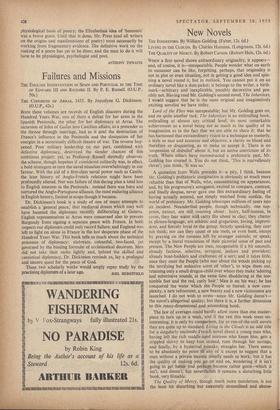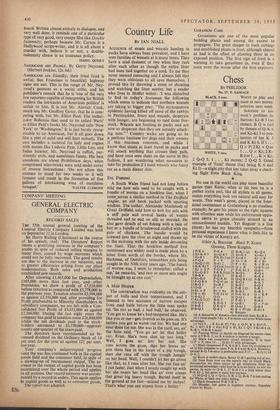New Novels
THE INHERITORS. By William Golding. (Faber, 12s. 6d.) WHEN a first novel shows extraordinary originality, it appears— and, of course, it is—unrepeatable. People wonder what on earth its successor can be like, forgetting, perhaps, that originality is not in plot or even situation, not in getting a good idea and spin- ning a novel round it, but in outlook. You cannot put it on an ordinary 'novel like a dust-jacket; it belongs to the writer, a birth- mark—arbitrary and inexplicable, possibly decorative and pos- sibly not. Having read Mr. Golding's second novel, The Inheritors, I would suggest that he is the most original and imaginatively exciting novelist we have today.
Lord of the Flies was unrepeatable; but Mr. Golding goes on, and on quite another tack. The Inheritors is an enthralling book, enthralling at almost any critical level, its most remarkable achievement as a novel being not so much in the quality of its imagination as in the fact that we are able to share it; that he has harnessed that extraordinary vision to a technique so masterly, a style so taut and accurate and objective, a clarity so bland and therefore so disquieting, as to make us accept it. There is no 'suspension of disbelief' about it, but an active conviction of its truth. Where others have reconstructed a prehistoric past, Mr. Golding has created it. You do not think, 'This is marvellously clever'; you think, 'It was so.'
A quotation from Wells precedes it—a pity, I think, because Mr. Golding's prehistoric imagination is obviously so much more valuable than that of Wells, who, concentrating on appearances, and, by his progressive's arrogance, excited to compare, contrast, and finally despise, never gave one this extraordinary feeling of having actually entered, not simply watched from oudide, the world of prehistory. Mr. Golding telescopes millions of years into an incident. Neanderthal people, though technically, one sup- poses, extinct, are still roaming about : hairy, half-human, in caves, they fear water and, carry fire about in clay; they chatter in picture-language, are athletic and gregarious, loving, improvi- dent, and fiercely loyal to the group. Strictly speaking, they can: not think; nor can they count or use tools, or even hunt, except by preying on the remains left by stronger animals; or speak, except by a literal translation of their pictorial sense of past and present. The New People are men, recognisable if a bit uncouth, already factious, selective, arrogant, jealous and provident; already boat-builders and craftsmen of a sort; and it takes little, once they meet the People (who tear about the woods picking up the terrifying but seductive scent of 'other), to wipe them out, retaining only a small dragon-child over whom they make 'adoring and submissive sounds, at the same time shuddering at the too- nimble feet and the red, curly hair.' Man is on his way; he has conquered the water which the People so feared; a new com- plexity, a new refinement, a new beauty and a new viciousness are launched. I do not wish to stress—since Mr. Golding doesn't— the novel's allegorical quality; but there it is, a further dimension to this many-dimensional and astonishing book.
The law of averages could hardly allow more than one master- piece to turn up in a week, and if the rest this week seem un- interesting, it is only by comparison, for as run-of-the-mill novels they are quite up to standard. Living in the Clouds is an odd title for a singularly uncloudy French novel about a young man who, having left the rich middle-aged mistress who keeps him, gets a crippled skivvY to keep him instead, runs through her savings, and finally, by a hysterical mistake, strangles her. There seems to be absolutely no point to any of it except to suggest that a man without a private income usually needs to work; but it has the quality of making you go on and on, wondering if it isn't going to get better and perhaps become rather good—which it isn't, and doesn't, but nevertheless it remains a disturbing little book, very filmablc.
The Quality of Mercy, though much more murderous, is not the least bit disturbing but extremely streamlined and above- board. Written almost entirely in dialogue, and vary well done, it reminds one of a particular type of very good, very creepy film like Double Indemnity, perhaps because Mr. Carson is a Hollywood script-writer, and it is all about a murder with, believe it or not, a double- indemnity clause in an insurance policy.
ISABEL QUIGLY



































 Previous page
Previous page